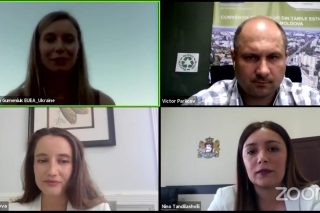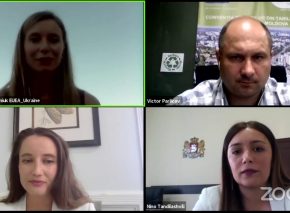
StrategEast hosted online panel “Green Energy in Eastern Partnership Countries”
The countries of the European Union approved the Green Deal and announced the transition to renewable energy sources as one of the priorities for economic development. But Europe’s green industry will be of little benefit if neighboring countries continue to rely on polluting traditional energy. How can the EU motivate the countries of the Eastern Partnership to join the European Green Deal? These issues were discussed at the StrategEast.Live session “Green Energy in Eastern Partnership countries”.
Panel Moderator Oleksandra Gumeniuk, Director, European Ukrainian Energy Agency, began the panel with success story on green energy in Ukraine. The local industry is developing largely thanks to foreign investments and global investors acknowledge how skilled Ukrainian companies are. In total, 800 companies in the field of green energy currently operate in Ukraine. Of these, 300 companies are small businesses. Another 300 are companies with international investments. Ten percent of all households have built their own solar panels.
Quite recently, an important event took place on the Ukrainian green energy market – a memorandum was signed on reducing tariffs for green energy. International investors also agreed to this.
Olga Khakova, Associate Director for European Energy Security, Atlantic Council noted that the transition to market prices today is the main challenge for green energy in the Eastern Partnership countries. Today, green energy in the Eastern Partnership countries is a direction that is largely developing thanks to subsidized tariffs. Rather tough issue is the transfer of this entire sector of the economy to a market track. At the same time, local governments always have to remember that tariffs should be affordable for the local population.
The transition to market tariffs, according to Ms. Khakova, also brings new opportunities: one can become an energy supplier for the European Union. After all, now it is green energy at market prices consistent with all the principles of the European Union. And this is a great opportunity for the Eastern Partnership countries.
Victor Parlicov, National Expert, Covenant of Mayors East in Moldova, devoted his presentation to the legislative aspects of green energy. Moldova has long ago brought all of its energy legislation in line with the European Union legislation. Many Moldovan laws begin directly with the wording “in accordance with the EU directive …” and so on. Therefore, one can say that Moldova is definitely becoming a part of the European Green Deal.
Nino Tandilashvili, Deputy Minister, Ministry of Environmental Protection and Agriculture of Georgia, explained that for Georgia, which has signed an Association Agreement with the European Union, developing green energy production is part of a strategic partnership with the EU and with Western countries in general. Georgia is developing hydropower with the help of US, Turkish and Norwegian companies. Wind energy also began to develop. With the help of the World Bank, a strategic program for the development of green energy has been created and the impact of large projects such as large hydropower plants on the environment is being tested.
The participants noted that one more direction that leads the countries of the Eastern Partnership to Green Deal standards is energy efficiency and reducing energy consumption in general. That will help make the economies of these countries environmentally neutral.



